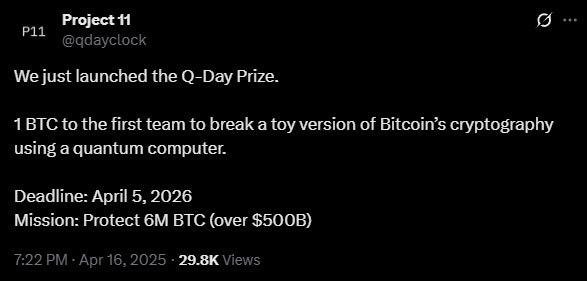A new challenge has emerged at the intersection of quantum computing and Bitcoin.
Quantum computing research firm Project Eleven has launched the Q-Day Prize, where you can win 1 bitcoin (worth around $84,000) by cracking a Bitcoin private key using a quantum computer.


The challenge was announced on April 16, 2025 and runs until April 5, 2026 and it aims to test how real the quantum threat is to Bitcoin’s core security system, elliptic curve cryptography (ECC).
“The mission: break the largest ECC key possible using Shor’s algorithm on a quantum computer. No classical shortcuts. No hybrid tricks. Pure quantum power,” Project Eleven wrote on X.
Bitcoin’s security is based on ECC, which is currently unbreakable by classical computers. But quantum computers could change that.
According to Project Eleven, over 10 million Bitcoin addresses have exposed their public keys.
If quantum computers become powerful enough, those exposed addresses could be vulnerable. In total, that’s more than 6 million bitcoin—worth nearly $500 billion—at risk.
“Quantum computing is steadily progressing. Nobody has rigorously benchmarked this threat yet,” the firm said.
You can register as an individual or as a team for the Q-Day Prize.
To win, you must use Shor’s algorithm—a quantum algorithm that can factor large numbers efficiently—to crack as much of a Bitcoin private key as possible.
Even if you don’t crack a full key, breaking just a few bits would be a big deal.
“If somebody breaks a 5-bit key, it will be a breakthrough,” Project Eleven noted.
Shor’s algorithm is for quantum computers only. That means no help from classical computers, no shortcuts—just raw quantum power.
So far, no real-world ECC key has ever been broken, making this challenge both historic and technically difficult.
According to experts, a quantum computer would need around 2,000 error-corrected “logical” qubits to fully crack a 256-bit ECC key. And we’re not there yet.
Currently, the most advanced quantum chips—like IBM’s Heron and Google’s Willow—can handle 156 and 105 physical qubits, respectively.
One logical qubit typically requires around 1,000 physical qubits — but this is a rough estimate. The number can vary depending on hardware error rates and coding schemes.
That means we will need around 2,000,000 to 2,500,000 physical qubits to be able to form something that could break ECDSA.
That’s a long way from the 150 we already have. Progress is being made, but no one knows at what pace. Experts believe increasing this number becomes exponentially difficult.
Entrants can use the quantum machines available on IBM, Amazon Web Services and Google to participate in the challenge.
The Q-Day Prize isn’t about theft or hacks—it’s about assessing whether quantum computers pose a serious threat to Bitcoin, and getting quantum-proof security before it’s too late.
This might force the Bitcoin industry to develop more advanced, long-lasting security measures that would ultimately benefit the whole ecosystem and all users.
The Bitcoin community is already acting. In early April, a Bitcoin Improvement Proposal (BIP) called QRAMP—Quantum-Resistant Address Migration Protocol—was proposed.
This would force all users to switch to quantum-resistant cryptography but would require a hard fork of the Bitcoin network which is hard to achieve unitedly.
Another idea proposed by quantum startup BTQ is a mining alternative called Coarse-Grained Boson Sampling (CGBS).
This would replace Bitcoin’s current mining method with one based on quantum mechanics. But like QRAMP, this would also require a hard fork and doesn’t have widespread support yet.
The Bitcoin community is divided on how urgent the quantum threat is. Some see it as a long-term problem, others say it’s time to start preparing now.
“I think it’s far from a crisis, but given the difficulty in changing Bitcoin, it’s worth starting to seriously discuss,” said Bitcoin advocate Jameson Lopp in a recent blog post.

